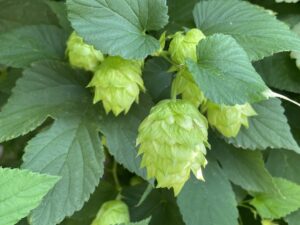What Does IBU Stand For?

In this second edition to our series of common brewery tour questions, I wanted to tackle an abbreviation that pops up on lots of beer menus: IBU. Today we will talk about what this abbreviation stands for and how it might be useful next time you are perusing the selection at your favorite beer bar.
IBU stands for International Bitterness Unit
Brewers take a wide variety of measurements during the brewing process, and one is the mathematical amount of bittering compound in their beers. Bitterness in beer comes primarily from hops added during the boil. Hops naturally contain compounds called Alpha Acids, and it is these Alpha Acids that give beer its bitterness. The tricky thing about these Alpha Acids is that they must be boiled to lend that bitterness. A chemical process called isomerization has to take place. Isomerization is essentially a rearranging of the bonds of a molecule to produce a different shape. When hop Alpha Acids are isomerized, they can go into solution and lend bitterness to the beer.
One Milligram of Isomerized Alpha Acid in One Liter of Wort = 1 IBU
So, now you know what it is… Why should you care? Among the basic tastes humans can perceive, one of the most sensitive is bitterness. Some have a very strong physiological aversion to bitterness, and they would benefit from staying away from beers with a high IBU count. Others love the gripping bitter bite of a West Coast Style IPA, and those hopheads should look for the highest IBUs they can find.
The IBU scale itself ranges from 0 to 100-120, though there is a lot of disagreement about the upper ends of the spectrum. Many argue that above 100 IBUS, humans can’t notice a discernible difference in bitterness. Brewers’ wort can also reach a saturation point where it can’t take on any more Alpha Acids, so adding more and more hops won’t change the IBU number. For those who are sensitive to bitterness, beers with an IBU count below 40 will likely be your best bet.
Where IBUs get tricky…
Unfortunately, simply looking at the IBU number doesn’t always tell you how bitter a beer will taste. Other factors in the recipe can affect perceived bitterness. The biggest factor is the amount of residual sweetness in the beer. Brewers can add certain ingredients like crystal malts or lactose to boost the sweetness in a finished beer. Beers with a lot of residual sugar will taste less bitter than those without, even if the two beers have the same number of IBUs. Think of it like a cup of coffee. Black coffee has a certain amount of bittering compound in it, but as you add sugar to that coffee it tastes less bitter. You haven’t affected the amount of bittering compound in the coffee, you’ve just balanced it with sweetness.
So, now you know. IBU is an abbreviation for International Bitterness Units, a scale used to measure the amount of bittering compound present in any given beer. The higher the number, the more bittering compound the beer contains. If you are sensitive to bitterness, you might want to stay away from the higher end of the spectrum unless the beer’s description tells you about sweet flavors that might help balance out those hops. If you’d like to learn more, sign up for one of BREW-ed’s Brewery Tours the next time you’re in Asheville, or simply ask your question in the comments section.

